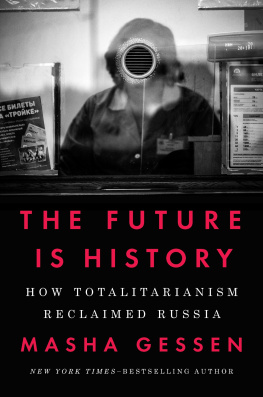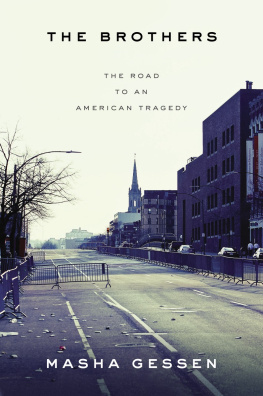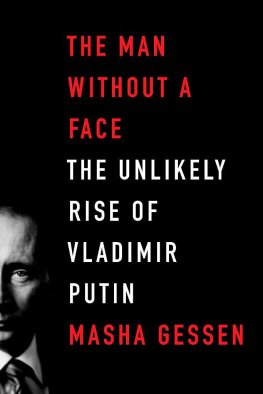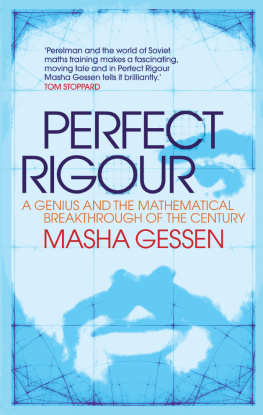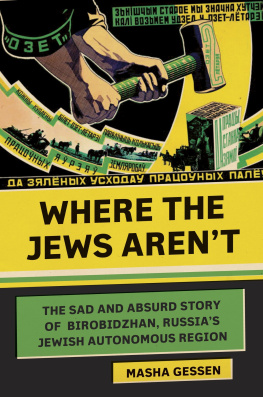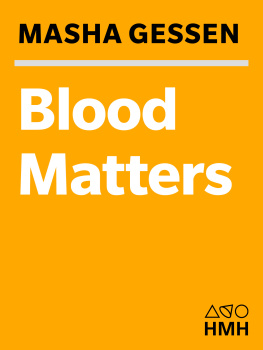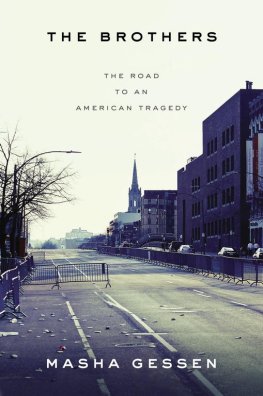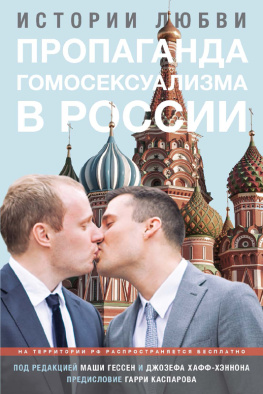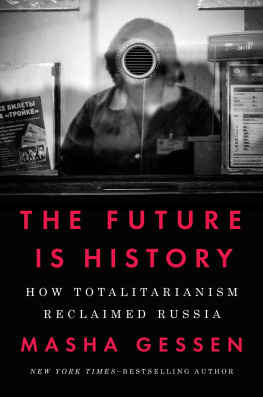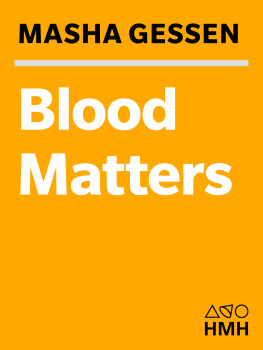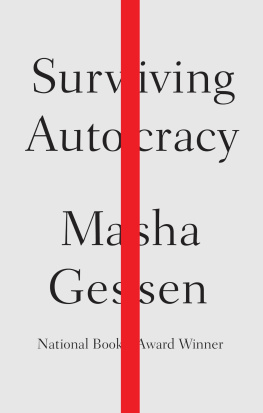ALSO BY MASHA GESSEN
Dead Again: The Russian Intelligentsia After Communism
Ester and Ruzya: How My Grandmothers Survived Hitlers War and Stalins Peace
Blood Matters: From Inherited Illness to Designer Babies,How the World and I Found Ourselves in the Future of the Gene
Perfect Rigor: A Genius and theMathematical Breakthrough of the Century
The Man Without a Face: The Unlikely Rise of Vladimir Putin
Words Will Break Cement: The Passion of Pussy Riot
Gay Propaganda: Russian Love Stories (editor)
The Brothers: The Road to an American Tragedy

RIVERHEAD BOOKS
An imprint of Penguin Random House LLC
375 Hudson Street
New York, New York 10014

Copyright 2017 by Masha Gessen
Penguin supports copyright. Copyright fuels creativity, encourages diverse voices, promotes free speech, and creates a vibrant culture. Thank you for buying an authorized edition of this book and for complying with copyright laws by not reproducing, scanning, or distributing any part of it in any form without permission. You are supporting writers and allowing Penguin to continue to publish books for every reader.
Anna Akhmatovas publishing rights are acquired via FTM Agency, Ltd., Russia.
Verses from Requiem by Anna Akhmatova are quoted from Anna Akhmatova: Selected Poems Including Requiem by A.S. Kline, translator. Copyright 2005, 2012. All rights reserved.
Verses from Snow-Clad Is the Plain by Sergey Yesenin are translated from the Russian by Alec Vagapov.
Library of Congress Cataloging-in-Publication Data
Names: Gessen, Masha, author.
Title: The future is history : how totalitarianism reclaimed Russia / Masha Gessen.
Other titles: How totalitarianism reclaimed Russia.
Description: New York : Riverhead Books, 2017. Includes bibliographical references and index.
Identifiers: LCCN 2017014363 (print) | LCCN 2017034714 (ebook) | ISBN 9780698406209 (ebook) | ISBN 9781594634536 (hardcover)
Subjects: LCSH: Russia (Federation)Politics and government1991 | Russia (Federation)History1991 | Moscow Region (Russia)Intellectual life. | Russia (Federation)Biography.
Classification: LCC DK510.763 (ebook) | LCC DK510.763 .G48 2017 (print) | DDC 947.086dc23
LC record available at https://lccn.loc.gov/2017014363
p. cm.
While the author has made every effort to provide accurate Internet addresses at the time of publication, neither the publisher nor the author assumes any responsibility for errors, or for changes that occur after publication. Further, the publisher does not have any control over and does not assume any responsibility for author or third-party websites or their content.
Version_1
IN MEMORY OF SVETLANA BOYM
CONTENTS
DRAMATIS PERSONAE
SEVEN PEOPLE ACT as the main characters of this book, making appearances throughout the narrative. I have used a modified Russian convention to refer to them. As anyone who has ever read a Russian novel knows, Russians have numerous names. A persons legal name is the full first name plus a patronymica form of the fathers name. In contemporary life, however, the name/patronymic combination is generally reserved for formal occasions and for older people. At the same time, most full names have a variety of diminutives that derive from them. Most Russians have a diminutive that was chosen for them in childhood and continue to use it throughout their lives; most, though not all, diminutives derive clearly from their full name, which can be reverse-engineered from the diminutive. For example, all Sashas are Alexanders; most Mashas are Marias. Children are almost always addressed by their diminutive.
In this book, those who first appear in the story as children are called by their diminutive throughout (e.g., Masha, Lyosha). Those who first appear as adults are called by their full names (e.g., Boris, Tatiana). Those who first appear as older people are introduced by their name and patronymic and referred to by these names for the duration of the book. Below is a list of the main characters. Dozens of other people are mentioned in this book; their names are not on this list because their appearances are episodic.
Zhanna (b. 1984)
Boris Nemtsov, father
Raisa, mother
Dmitry, husband
Dina Yakovlevna, grandmother
Masha (b. 1984)
Tatiana, mother
Galina Vasilyevna, grandmother
Boris Mikhailovich, grandfather
Sergei, husband
Sasha, son
Seryozha (b. 1982)
Anatoly, father
Alexander Nikolaevich Yakovlev, grandfather
Lyosha (b. 1985)
Galina, mother
Yuri, biological father
Sergei, stepfather
Serafima Adamovna, grandmother
Marina Arutyunyan, psychoanalyst
Maya, mother
Anna Mikhailovna Pankratova, grandmother
Lev Gudkov, sociologist
Alexander Dugin, philosopher, political activist
PROLOGUE
I HAVE BEEN TOLD many stories about Russia, and I have told a few myself. When I was eleven or twelve, in the late 1970s, my mother told me that the USSR was a totalitarian stateshe compared the regime to the Nazi one, an extraordinary act of thought and speech for a Soviet citizen. My parents told me that the Soviet regime would last forever, which was why we had to leave the country.
When I was a young journalist, in the late 1980s, the Soviet regime began to teeter and then collapsed into a pile of rubble, or so the story went. I joined an army of reporters excitedly documenting my countrys embrace of freedom and its journey toward democracy.
I spent my thirties and forties documenting the death of a Russian democracy that had never really come to be. Different people were telling different stories about this: many insisted that Russia had merely taken a step back after taking two steps toward democracy; some laid the blame on Vladimir Putin and the KGB, others on a supposed Russian love of the iron fist, and still others on an inconsiderate, imperious West. At one point, I was convinced that I would be writing the story of the decline and fall of the Putin regime. Soon after, I found myself leaving Russia for the second timethis time as a middle-aged person with children. And like my mother before me, I was explaining to my children why we could no longer live in our country.
The specifics were clear enough. Russian citizens had been losing rights and liberties for nearly two decades. In 2012, Putins government began a full-fledged political crackdown. The country waged war on the enemy within and on its neighbors. In 2008, Russia invaded Georgia, and in 2014 it attacked Ukraine, annexing vast territories. It has also been waging an information war on Western democracy as a concept and a reality. It took a while for Western observers to see what was happening in Russia, but by now the stories of Russias various wars have become familiar. In the contemporary American imagination, Russia has reclaimed the role of evil empire and existential threat.
The crackdown, the wars, and even Russias reversion to type on the world stage are things that happenedthat I witnessedand I wanted to tell this story. But I also wanted to tell about what did not happen: the story of freedom that was not embraced and democracy that was not desired. How do you tell a story like that? Where do you locate reasons for the absences? When do you begin, and with whom?

